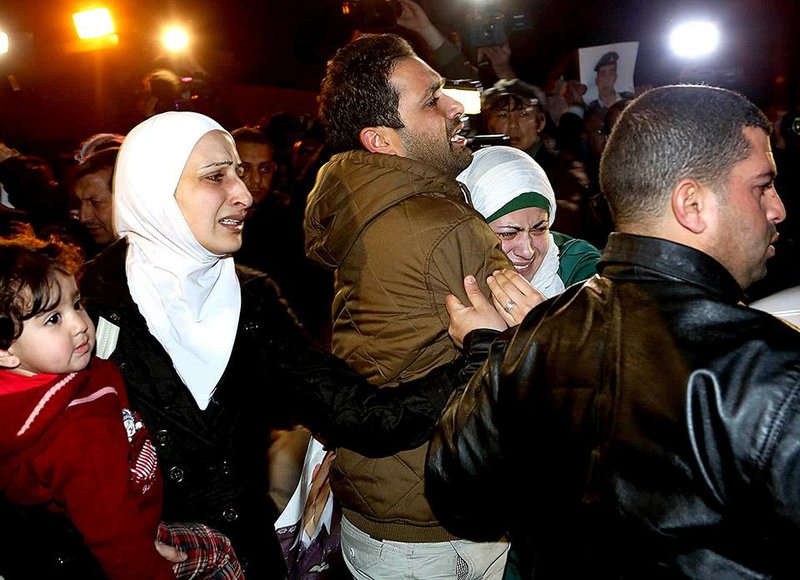AMMAN, Jordan -- The Islamic State group released a message late Wednesday purportedly extending the deadline for Jordan's release of an Iraqi would-be hotel bomber linked to al-Qaida.
The audio message, read by a person claiming to be Japanese hostage Kenji Goto, was released as Jordan had offered a precedent-setting prisoner swap to the Islamic State group in an attempt to save a Jordanian air force pilot the militants reportedly threatened to kill, along with Goto.
The recording, in English, said the Jordanians must present Sajida al-Rishawi at the Turkish border by sunset today, or Jordanian pilot Muath al-Kaseasbeh will be killed.
The Associated Press could not independently verify the contents of the recording, which was distributed on Twitter by Islamic State-affiliated accounts.
Earlier Wednesday, the pilot's father met with Jordan's king who he said assured him that "everything will be fine."
King Abdullah II faces growing domestic pressure to bring the pilot home. However, meeting the Islamic State's demand for the release of al-Rishawi would run counter to the kingdom's hard-line approach to the extremists.
Efforts to release al-Kaseasbeh and Goto, a journalist, gained urgency with the release late Tuesday of what was said to be an online ultimatum claiming the Islamic State group would kill both hostages within 24 hours if the al-Qaida-linked prisoner was not freed.
"We've asked for proof of life of our hero al-Kaseasbeh, that he's safe and healthy, but we did not get it," Foreign Minister Nasser Judeh said on Twitter.
The scope of a possible swap and of the Islamic State group's demands also remained unclear.
Jordanian government spokesman Mohammed al-Momani said Jordan is ready to trade the prisoner, an Iraqi woman convicted of involvement in deadly Amman hotel bombings in 2005, for the pilot. Al-Momani made no mention of Goto, and it was not clear whether the swap proposed by Jordan would satisfy the hostage-takers.
Al-Kaseasbeh, 26, was seized after his Jordanian F-16 crashed in December near the Islamic State group's de facto capital of Raqqa in Syria. He is the first foreign military pilot the militants have captured since the coalition began its airstrikes in August.
Any exchange would set a precedent for negotiating with the Islamic State militants, who in the past have not publicly demanded prisoner releases. Jordan's main ally, the United States, opposes negotiations with extremists.
The release of al-Rishawi also would be a propaganda coup for the militants who have already overrun large parts of neighboring Syria and Iraq. Jordan is part of a U.S.-led military alliance that has carried out airstrikes against Islamic State targets in Syria and Iraq in recent months.
Participation in the alliance is unpopular in Jordan, and the capture of the pilot has exacerbated such sentiments, analysts said.
"Public opinion in Jordan is putting huge pressure on the government to negotiate with the Islamic State group," said Marwan Shehadeh, a scholar with ties to ultraconservative Islamic groups in Jordan. "If the government doesn't make a serious effort to release him, the morale of the entire military will deteriorate and the public will lose trust in the political regime."
The pilot's family, meanwhile, is increasingly vocal in its criticism of the government.
Several dozen protesters gathered Wednesday outside Abdullah's palace in Amman, urging the government to do more to win the release of the pilot.
"Listen, Abdullah, the son of Jordan [the pilot] must be returned home," the protesters chanted.
The pilot's father, Safi al-Kaseasbeh, was part of the group and was allowed into the palace, along with his wife, to meet Abdullah.
"The king told me that Muath is like my son, and God willing, everything will be fine," al-Kaseasbeh said afterward.
Earlier, Safi al-Kaseasbeh criticized the government's handling of the crisis. He broke weeks of silence, requested by government officials, to make the statement at a demonstration.
"I contacted the Turkish authorities after I found that the Jordanian government is not serious in the negotiations," he said. "The government needs to work seriously, the way one would do to free a son, like the Japanese government does."
Al-Rishawi was one of four suicide bombers who attacked three hotels in Amman, the Jordanian capital, in 2005. Her explosive vest did not detonate, and she was soon captured.
"Who is Sajida to us?" the pilot's father said during the demonstration. "Sajida is a burden on us, let them release her. I am asking for the release of Sajida and all the prisoners, and the return of Muath to us."
Many of the demonstrators shouted slogans critical of the government and of Abdullah. While such conduct has led to arrests in the past, the authorities stood by without intervening. The protest began late Tuesday and continued into the early morning hours, when al-Kaseasbeh made his comments.
Muath al-Kaseasbeh comes from a prominent family and a large tribe from the central Jordanian city of Karak. Jordanian officials were concerned enough about his relatives' reaction that Abdullah visited them a day after the pilot's capture, on Dec. 24.
Jordan reportedly is holding indirect talks with the militants through religious and tribal leaders in Iraq to secure the release of the hostages.
In his brief statement, al-Momani said Jordan is willing to swap al-Rishawi for the pilot if the pilot is released unharmed. Al-Rishawi was sentenced to death for her involvement in the al-Qaida attack on hotels in Amman that killed 60 people.
In Tokyo, Goto's mother, Junko Ishido, appealed publicly to Prime Minister Shinzo Abe.
"Please save Kenji's life," Ishido said, begging Abe to work with the Jordanian government until the very end to try to save Goto, 47. "Kenji has only a little time left."
Ishido said both Abe and Japan's main government spokesman had declined to meet with her.
Later, a few dozen people gathered outside the prime minister's official residence, holding banners expressing hopes for Goto's release.
"I have been trying to keep my hopes up and believe that Mr. Goto will return. I have this faith within me," said Seigo Maeda, a friend of Goto.
Japanese government spokesman Yoshihide Suga said the government was analyzing the latest message and stressed that Japan was doing its utmost for the release of Goto, working with nations in the region, including Turkey, Jordan and Israel.
Suga declined comment on the specifics of the talks with Jordan, saying the situation was developing. Government officials will meet later in the day to assess the latest developments, he told reporters.
Earlier in response to a ruling party lawmaker's question in the nation's parliament, Abe reiterated his condemnation of the Islamic State hostage-taking.
"The heinous terrorist act is totally unforgivable," he said.
The militants reportedly have killed one Japanese hostage, Haruna Yukawa.
This is the first time the group publicly has demanded the release of prisoners in exchange for hostages. Previous captives may have been freed in exchange for ransom, although the governments involved have refused to confirm any payments were made.
Goto, a freelance journalist, was captured in October in Syria, apparently while trying to rescue Yukawa, 42, who was taken hostage last summer.
Information for this article was contributed by Karin Laub, Mohammed Daraghmeh, Omar Akour, Elaine Kurtenbach, Kaori Hitomi, Emily Wang, Koji Ueda and Mari Yamaguchi of The Associated Press and by Rod Nordland and Ranya Kadri of The New York Times.
A Section on 01/29/2015


